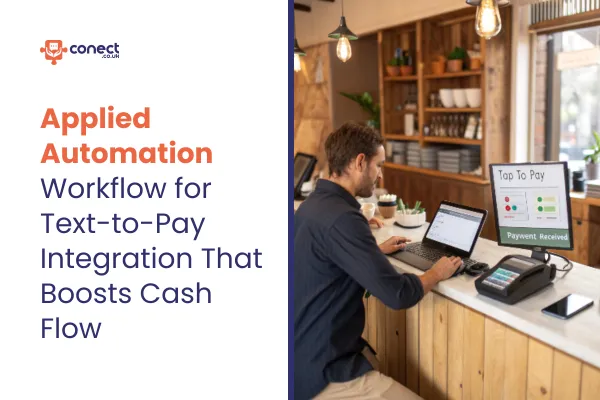
Applied Automation Workflow Text-to-Pay Boosts Cash Flow
Applied Automation Workflow for Text-to-Pay Integration That Boosts Cash Flow
Getting paid faster is every business owner's dream. Yet most companies still struggle with delayed payments, manual invoice processes, and poor cash flow management.
The solution lies in implementing an applied automation workflow that seamlessly integrates text-to-pay functionality with your existing business operations.
Modern businesses are discovering that automated payment collection through SMS can reduce payment delays by up to 75% while significantly improving customer satisfaction.
Why Traditional Payment Methods Slow Down Your Cash Flow
Traditional invoicing creates unnecessary friction in the payment process. Customers receive invoices via email, need to log into payment portals, and often forget to complete transactions.
This outdated approach leads to several cash flow challenges:
Payment delays averaging 30-45 days for service businesses
Administrative overhead from follow-up calls and emails
Lost revenue from forgotten or abandoned payments
Reduced customer satisfaction due to complex payment processes
Small businesses particularly suffer from these inefficiencies. When cash flow becomes unpredictable, it affects everything from inventory management to employee payments.
Understanding Applied Automation Workflow for Payment Collection
An applied automation workflow for text-to-pay integration creates a seamless connection between service delivery and payment collection. This system automatically triggers payment requests through SMS at predetermined points in your customer journey.
The workflow operates through intelligent triggers that activate based on specific customer actions or time intervals. When a trigger activates, the system instantly sends personalized payment requests directly to customers' mobile phones.
Key Components of Effective Payment Automation
Smart Trigger Points. The most effective applied automation workflow includes multiple trigger points throughout the customer journey. These triggers activate payment requests at optimal moments when customers are most likely to pay.
Personalized Messaging Automated payment texts maintain a personal touch while ensuring consistency across all customer communications. The system dynamically inserts customer names, service details, and payment amounts.
Multiple Payment Options: Customers receive secure payment links that support various payment methods, including credit cards, debit cards, and digital wallets.
How Text-to-Pay Integration Transforms Cash Flow Management
Text messaging maintains a 98% open rate compared to email's 20% open rate. This dramatic difference makes SMS the most effective channel for payment collection communications.
When customers receive payment requests via text, they can complete transactions instantly without switching between multiple applications or platforms.
Immediate Payment Processing Benefits
Faster Payment Cycles Businesses implementing text-to-pay automation typically see payment times reduced from weeks to hours. Customers appreciate the convenience and respond quickly to clear, actionable payment requests.
Reduced Administrative Overhead Manual follow-up processes disappear when automation handles payment reminders and processing. Staff members can focus on revenue-generating activities instead of chasing payments.
Improved Customer Experience: Customers prefer simple, straightforward payment processes. Text-to-pay eliminates password requirements, complex login procedures, and multi-step payment forms.
Implementing Applied Automation Workflow in Your Business
Successful implementation requires careful planning and a systematic approach. The process begins with mapping your current customer journey and identifying optimal trigger points for payment requests.
Phase One: Customer Journey Analysis
Start by documenting every touchpoint in your customer experience. Identify moments when customers expect to make payments and times when they're most satisfied with your service.
Common trigger points include:
Service completion confirmations
Appointment confirmations requiring deposits
Subscription renewal notifications
Outstanding balance reminders
Phase Two: Workflow Design and Testing
Design your applied automation workflow using a visual workflow builder that connects triggers, conditions, and actions. Test each pathway thoroughly before launching to ensure customers receive appropriate messages at correct times.
Message Template Creation Develop professional yet friendly message templates that clearly communicate payment expectations. Include essential information like amount due, service description, and secure payment links.
Timing Optimization Schedule payment requests for optimal response rates. Research shows that payment messages sent between 10 AM and 2 PM on weekdays generate the highest response rates.
Advanced Features That Maximize Cash Flow Impact
Modern applied automation workflow systems offer sophisticated features that go beyond basic payment reminders. These advanced capabilities help businesses optimize their entire revenue collection process.
Dynamic Payment Scheduling
Smart scheduling adjusts payment request timing based on customer behavior patterns. The system learns when individual customers typically make payments and adjusts future communications accordingly.
Automated Follow-Up Sequences
When initial payment requests don't generate immediate responses, automated follow-up sequences maintain consistent communication without overwhelming customers.
Escalation Protocols Implement graduated response protocols that increase urgency appropriately while maintaining professional tone throughout the collection process.
Alternative Payment Options Offer payment plan options through automated workflows when customers indicate inability to pay full amounts immediately.
Integration with Existing Business Systems
Effective applied automation workflow requires seamless integration with your current business management tools. This integration ensures payment automation works harmoniously with existing processes.
CRM System Connectivity
Connect payment automation with customer relationship management systems to maintain comprehensive customer records. This integration provides complete visibility into customer payment histories and preferences.
Accounting Software Integration
Automatic synchronization with accounting platforms like QuickBooks ensures that payment collections immediately update financial records. This real-time updating eliminates manual data entry and reduces accounting errors.
Appointment Booking Integration
For service-based businesses, integrate payment automation with appointment scheduling systems. This connection enables automatic deposit collection when customers book appointments.
Measuring Success and Optimizing Performance
Track key performance indicators to measure your applied automation workflow effectiveness. Important metrics include payment processing times, collection rates, and customer satisfaction scores.
Essential Performance Metrics
Days Sales Outstanding (DSO) Monitor how quickly customers pay after receiving services. Effective automation should significantly reduce DSO compared to traditional invoicing methods.
Payment Collection Rate Track the percentage of payment requests that result in successful collections. Higher rates indicate effective messaging and optimal timing.
Customer Response Time Measure how quickly customers respond to payment requests. Faster response times suggest that your workflow provides convenient, user-friendly payment experiences.
Compliance and Security Considerations
Payment automation must comply with financial regulations and data protection requirements. Ensure your chosen platform maintains PCI DSS compliance and follows industry security standards.
Data Protection Protocols Implement robust data protection measures that secure customer payment information throughout the automation process. Regular security audits help maintain compliance standards.
Regulatory Compliance Stay current with payment processing regulations in your jurisdiction. Automated systems should include compliance features that adapt to changing regulatory requirements.
Getting Started with Connect.uk Payment Automation
Connect.uk provides comprehensive applied automation workflow solutions that integrate text-to-pay functionality with complete business management systems.
The platform combines SMS marketing, CRM management, and payment processing into a unified solution that streamlines your entire customer experience.
Ready to transform your cash flow management through intelligent payment automation? Connect.uk offers a 15-day free trial that lets you experience the power of applied automation workflow without any commitment.
Start building your automated payment collection system today and discover how text-to-pay integration can revolutionize your business cash flow.
Frequently Asked Questions
1. How quickly can I set up automated payment collection for my business?
Most businesses can implement basic text-to-pay automation within 24-48 hours using pre-built templates. The setup involves connecting your payment processor and customizing message templates.
2. Will my customers feel overwhelmed by automated payment messages?
No, smart automation sends payment requests only at relevant moments in the customer journey. Proper timing ensures customers receive helpful reminders rather than spam-like communications.
3. Can I customize payment messages to match my brand voice?
Yes, modern platforms allow complete customization of message templates and branding elements. You can create messages that perfectly reflect your business personality.
4. What happens if customers don't respond to the first payment request?
Automated follow-up sequences send gentle reminders at appropriate intervals without being pushy. The system can escalate to alternative methods or offer payment plan options.
5. Is text-based payment collection secure for my customers?
Yes, reputable platforms use bank-level encryption and PCI DSS compliance for protection. Secure payment links direct customers to encrypted pages meeting industry security standards.

The All-In-One Solution to grow your business. Capture Free Leads And Conversationally Covert Them Into Customers!
Contact information
Address : Layton Lane, Rawdon, Leeds, LS19 6RG
Phone : +44 7859 775480
Email : [email protected]

